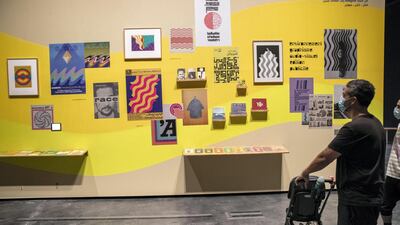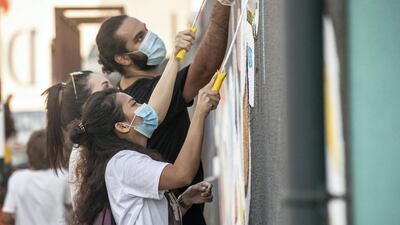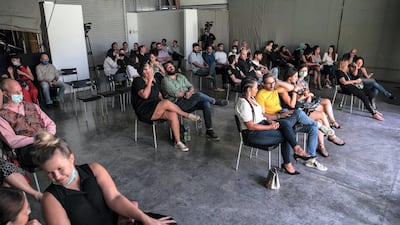Temperature checks, sanitising stations and social distancing reminders – these have become all too familiar to most of us in the last few months. And when Alserkal Avenue held its first art event since the onset of Covid-19 on Saturday, September 19, they were in full force.
From 10am to 10pm, the arts neighbourhood in Al Quoz held one of its yearly Alserkal Lates, an event typically marked by exhibition openings, live music and performances. Though art spaces in the UAE have gradually reopened since June, none have hosted any large gatherings so far.
Alserkal Avenue decided to push ahead with Lates, opting to tighten measures to safeguard against the coronavirus. For one, the event timings were extended to 12 hours instead of the 6pm to 10pm schedule of past years (hence the name “Lates”) to help spread out visits.
With DIFC planning its own galleries' night in November and Abu Dhabi Art on course to stage an edition later this year, Alserkal Avenue’s event serves as a litmus test for what is possible for future art events and whether the public will show up.
For Lates 2020, capacity was narrowed to 5,000 people, with numbers monitored through pre-existing footfall counters at entrances and exits. Alserkal Avenue did not provide the visitor tally this year, but stated that it welcomed 10,000 people for Alserkal Lates in September 2019.
Masks were mandatory, as were temperature checks at entry points.

As student Defne Ozden, 18, pointed out, communication was also helpful in navigating our so-called new reality with signs and floor markings all around the venue. “There’s a lot of posters that say what you should do,” she said, adding, “Since there aren’t that many people, I feel safe. The guards checked our temperature, and I didn’t really see anyone not obeying the mask rule.”
One of the signs on the footpath read, "it's not you, it's Covid-19."
Among the galleries, restaurants and retail spaces, however, practices were varied, with some taking extra measures. Ishara Art Foundation, for example, asked visitors to fill out forms for contact tracing. Gallery Isabelle van den Eynde set up a sanitising station replete with masks, hand sanitiser and gloves at their entrance. For all spaces, signs indicating capacity and reminders of rules were stuck on entrance doors.

Physical distancing was the hardest measure to maintain. Even with fewer people going into galleries, paths still sometimes cross when looking at the works. A more stark example was at the entrance of the exhibition New Waves: Mohamed Melehi and the Casablanca Art School Archives, a major retrospective on the Moroccan artist, housed inside multidisciplinary space Concrete.
Capacity was originally set to 25 visitors, but reduced to 10 shortly before the opening. Entry to the show required pre-booking, though drop-ins were welcomed provided there was enough space. This led to lines outside the venue, which had only one entrance and exit point.
There were also short lines outside of Custot Gallery, which was showing works by Thomas Saraceno and Koo Jeong A. In both these cases, the lines often dissipated within minutes, though they indicate that visitors are still adjusting to new booking systems and that getting inside a gallery may now take longer than expected.
Still, people expressed their approval over the comeback of cultural activities in the UAE. “It shows that there is initiative and that things are happening,” visitor Andre M said. “Art is a way to connect and exchange thoughts that sometimes we are not able to share easily,” he added.
“People are social beings, and the fact that you have art that’s sparking conversation takes our mind away from current events,” architect and illustrator Sarah Al Adayleh said. She has attended past Alserkal Avenue events and noted one change in the experience. “People are wearing masks that conceal their expressions, and sometimes it’s interesting to see other people’s expressions change as they’re looking at the piece. For me, that was always entertaining, but now I’m more focused on my reaction. It’s more inward.”

Interactions like these are just one consequence of Covid-19. Before the pandemic, exhibition openings usually brought together collectors, patrons and artists, with groups congregating in galleries to socialise. While artist Saba Qizilbash, who lives in the UAE, was able to attend the opening of her show at 1x1 Art Gallery, Hera Buyuktasciyan in Turkey witnessed hers via Zoom through the help of the team at Green Art Gallery.
Malini Gulrajani, founder of 1x1, said that the extended event timings helped with maintaining safety protocols. With new faces and collectors both coming by the gallery throughout the day, she was satisfied with sales and footfall, considering the situation. “We needed it to elevate the mood and bring back some hope,” she said.

For other businesses, reopening goes beyond financial considerations. At The Fridge, the band Cubai performed to 60 people in a space usually meant for 180. “The concert barely made money to cover the technical costs,” director Shelley Frost said. The performing arts have been hit hard by the closures, with bands like Cubai unable to perform since March.
Speaking about her reasons for staging these shows despite a lack of financial viability, Frost said, “We need to take positive steps together as a society as we come out of lockdown. We want that return to confidence. It’s about learning to be comfortable in a new setting.”
The Fridge reconfigured seating arrangements in checkerboard style with two metres distance. Attendees are permitted to remove masks while in their area, but most wear them when they move around the space.
“We also feel a burden of responsibility towards the artists we represent. It’s important for these mechanisms to keep going again,” she added.
As art season in the UAE picks back up and institutions announce their autumn programmes, Alserkal Lates signals the public’s readiness for the return of cultural events. Over at Sharjah Art Foundation, for example, Tarek Atoui performed to a small group of attendees for his new show Cycles in 11. The future is still uncertain, but at least the doors are open.














